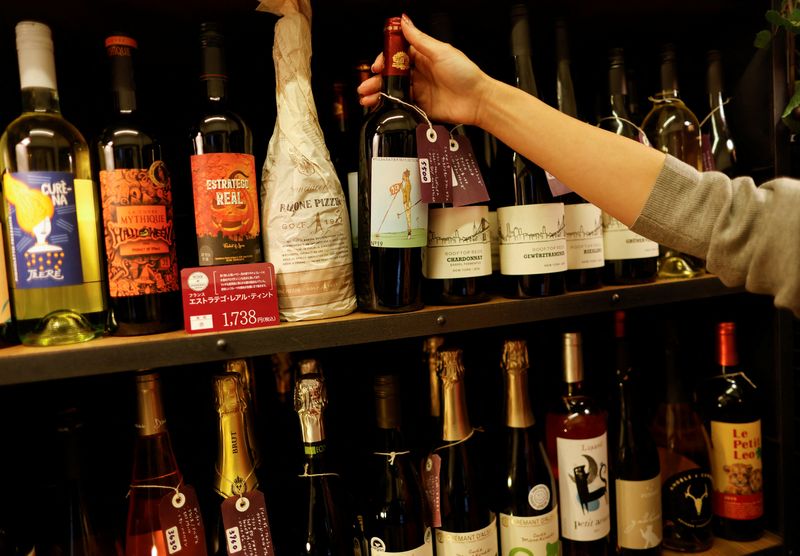Climate change, Russia-Ukraine war hit global wine industry:OIV
2022.11.03 12:55
[ad_1]

© Reuters. FILE PHOTO: Imported wines from different countries, including the U.S., are displayed at the wine shop ‘Wine and Weekend’ in Tokyo, Japan October 21, 2022. REUTERS/Issei Kato
By Diego Oré
MEXICO CITY (Reuters) – Climate change and the Russia-Ukraine war are squeezing global sales and production in the $300 billion global wine industry, which is still recovering from the pandemic, said the International Organization of Vine and Wine (OIV).
Pau Roca, Director General of the OIV, which comprises 49 producing countries, said firms must adapt to droughts, frosts and heavy rain produced by global warming, as they have become regular phenomena.
“We continue to see the effects of climate change,” Roca told Reuters on Wednesday in Mexico, underlining that in 2022 global wine production will fall slightly due to poor weather in Europe, home to top producers Italy, France and Spain.
“We have a long history that confirms that climate change is having an enormous and constant impact on the wine sector,” said the 64-year-old Spaniard, who is visiting Mexico for the 43rd World Congress of Vine and Wine.
OIV production’s forecast for 2022 is between 257.5 and 262.3 million hectoliters (Mhl), or 259.9 Mhl on average, down 1% from 2021 and below the average of the last 20 years.
Last year, Spain exported 24.2 million euros worth of wine to Russia and 16.2 million euros to Ukraine. This year that total will fall to almost zero, Roca said.
“There’s a complete disruption in the markets,” he said.
The executive said the wine industry is suffering more from the energy crisis sparked by the conflict, with higher inflation sapping consumer spending.
Pau said imports of European wine to the United States have recovered since then-President Donald Trump in 2019 imposed tariffs on the drink that were lifted in mid-2021.
Now big wine producers want to expand in the U.S. market, where per capita consumption is still low, Pau said.
“It has a very significant growth potential”, he said.
[ad_2]
Source link








